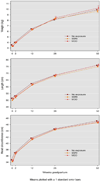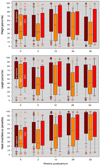Does fetal exposure to SSRIs or maternal depression impact infant growth?
- PMID: 23511234
- PMCID: PMC4113116
- DOI: 10.1176/appi.ajp.2012.11121873
Does fetal exposure to SSRIs or maternal depression impact infant growth?
Erratum in
- Am J Psychiatry. 2013 Oct 1;70(10):1218
Abstract
Objective: The aim of this study was to compare the growth of infants born to women with antenatal major depressive disorder, either untreated or treated with selective serotonin reuptake inhibitor (SSRI) antidepressants, and infants born to a nondepressed, nonmedicated comparison group across the first year of life.
Method: In this prospective observational study, pregnant women were evaluated at weeks 20, 30, and 36 of gestation, and mother and infant pairs were assessed at 2, 12, 26, and 52 weeks postpartum. Three nonoverlapping groups of women were defined according to their pregnancy exposures: 1) no SSRI and no depression (N=97), 2) SSRI (N=46), and 3) major depression without SSRI (N=31). Maternal demographic and clinical characteristics and newborn outcomes were compared across exposure groups. Infant weight, length, and head circumference were measured by a physician or physician's assistant who was blind to depression and SSRI exposure status at each postpartum time point.
Results: Both adjusted and unadjusted analyses revealed neither antenatal major depression nor SSRI exposure was significantly associated with infant weight, length, or head circumference relative to nonexposure to either. In addition, the interaction of group and prepregnancy body mass index was also evaluated, and no significant synergistic effect was identified. Similarly, no differential effect of group over time was observed for weight, length, or head circumference.
Conclusions: In utero exposure to major depression or SSRI antidepressants did not affect infant growth with respect to weight, length, or head circumference from birth through 12 months of age.
Figures
Comment in
-
Long-term effects of prenatal SSRI exposure on child growth: weighing the evidence.Am J Psychiatry. 2013 Nov;170(11):1364. doi: 10.1176/appi.ajp.2013.13040472. Am J Psychiatry. 2013. PMID: 24185243 No abstract available.
-
Response to Grzeskowiak and Morrison.Am J Psychiatry. 2013 Nov;170(11):1364-5. doi: 10.1176/appi.ajp.2013.13040472r. Am J Psychiatry. 2013. PMID: 24185244 Free PMC article. No abstract available.
References
-
- Bennett IM, Marcus SC, Palmer SC, Coyne JC. Pregnancy-related discontinuation of antidepressants and depression care visits among Medicaid recipients. Psychiatric services (Washington, DC) 2010;61(4):386–391. - PubMed
-
- Suri R, Altshuler L, Hellemann G, Burt VK, Aquino A, Mintz J. Effects of antenatal depression and antidepressant treatment on gestational age at birth and risk of preterm birth. The American journal of psychiatry. 2007;164(8):1206–1213. - PubMed
-
- Cohen LS, Altshuler LL, Harlow BL, Nonacs R, Newport DJ, Viguera AC, et al. Relapse of major depression during pregnancy in women who maintain or discontinue antidepressant treatment. JAMA. 2006;295(5):499–507. - PubMed
-
- Bonari L, Pinto N, Ahn E, Einarson A, Steiner M, Koren G. Perinatal risks of untreated depression during pregnancy. Can J Psychiatry. 2004;49(11):726–735. - PubMed
Publication types
MeSH terms
Substances
Grants and funding
LinkOut - more resources
Full Text Sources
Other Literature Sources
Medical



